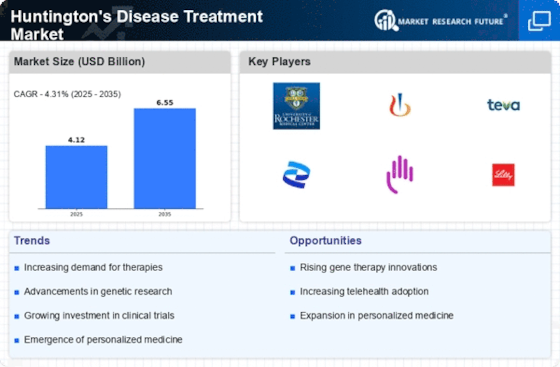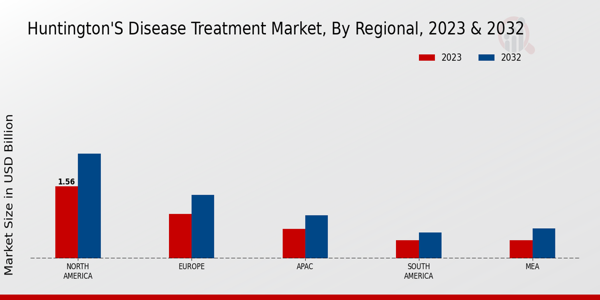Market Trends
Key Emerging Trends in the Huntington’s Disease Treatment Market
The transformative trends occurring in the Huntington's disease treatment market reflect efforts that are being made continually to address this complex neurodegenerative disorder and provide innovative therapeutic solutions. One noteworthy trend is the development of disease-modifying therapies targeted at the underlying genetic cause of Huntingdon’s disease. Improvements in genetics and molecular biology have resulted in investigation of gene silencing techniques such as antisense oligonucleotides (ASOs) and RNA interference (RNAi) which aim at reducing the production of mutant huntingtin protein causing the illness. Also, symptom management and supportive care are the main areas of focus aimed at improving patients’ lives with Huntington’s disease. Although there is no cure presently available, drugs targeting specific symptoms including chorea and psychiatric disturbances are under development. Further, various approaches involving physical therapy, and occupational therapy coupled with psychological support among others have shown effective strategies to manage diverse Huntington’s disease symptoms. Additionally, biomarker research in early detection as well as monitoring progression constitutes another developing feature present in this market for treating Huntingdon's Disease. Identifying reliable biomarkers can enable early intervention/monitoring therapy response effectiveness. The trend is indicative ongoing moves to improve diagnostic accuracy track progression streamline creation targeted therapies. Moreover, there is a growing trend towards patient registries and collaborative research initiatives within the field of Huntington's disease treatment. This is with the aim of global and national patient registries, which are collecting comprehensive data on patients suffering from Huntington’s disease facilitating joint research efforts. Another important trend is related to digital health technologies used for managing Huntington’s Disease. Mobile applications, wearable devices, and telemedicine platforms are being used to remotely monitor symptoms, offer educational materials, and improve patient-provider communication regarding this condition. This development corresponds with greater usage of digital health technologies to improve patient involvement, accessibility, and healthcare management. Furthermore, there is an emphasis on patient and caregiver support programs within the market for treating Huntington’s disease. Recognizing that individuals suffering from Huntington's disease (HD) are faced with emotional, social and financial difficulties; such support programs assist them navigate through their respective healthcare systems, accessing relevant resources along with coping with how HD affects their daily life. In doing so, this movement focuses more attention on holistic compassionate care besides medical interventions.
















Leave a Comment